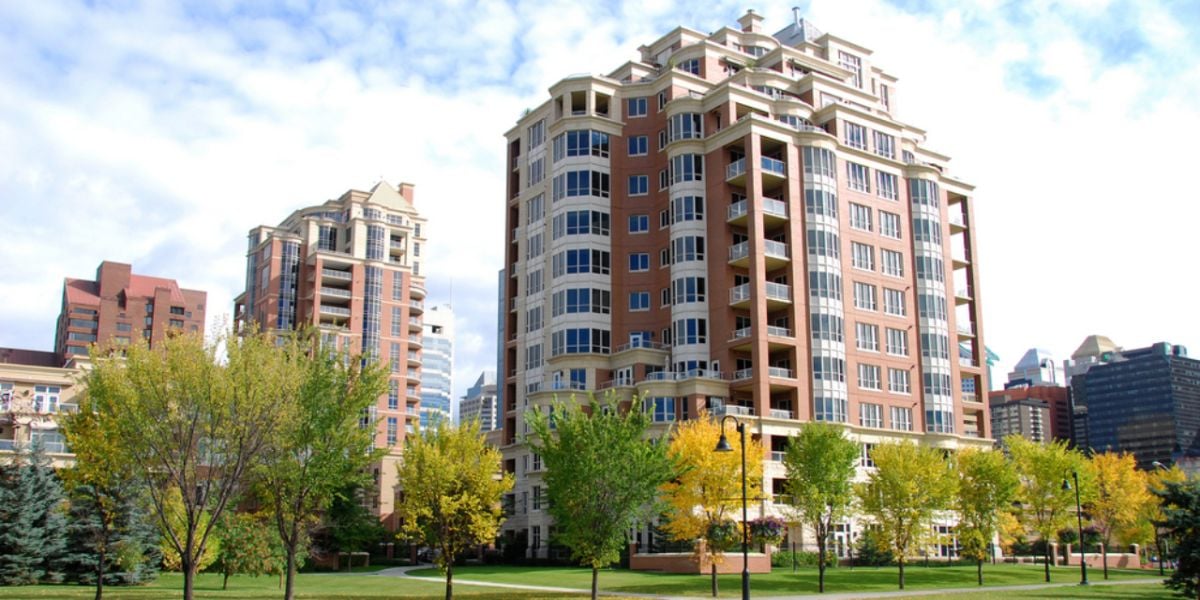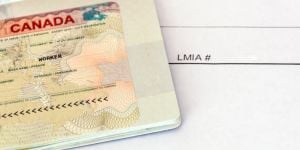
Here are some tips to assist you in finding accommodation in Calgary. It's advisable to familiarize yourself with the area and explore the various housing options before making your decision.
Finding a place to live in Calgary, in the province of Alberta, could take you a while, given that the region has been experiencing a low vacancy rate since 2012. According to the Nesto website, the average selling price of homes in Calgary rose 1.8% year-on-year to C$518,100 in September 2023. Townhouse prices rose 8.4% year-on-year to C$397,000. Condominiums remain a more affordable option if you want to become a homeowner. In September 2023, the median price of condominiums stood at C$297,500. The median rent for a one-bedroom apartment in Calgary is approximately CAD 1,686 per month.
Before you decide, you need to estimate your budget and determine which option is best for you. Check whether you can buy a house or an apartment or whether renting is what you need. Basement apartments are generally less expensive, but they are much less bright, especially in winter. You can check websites such as Craigslist and RentFaster and read the classifieds section in local newspapers to get an idea of what type of accommodation is available in Calgary. Online platforms like Remax and Century21 specialize in sales, while you'll find plenty of rentals on RentBoard and PadMapper. You can also ask your contacts on social networks if they know of any houses or apartments for rent in Calgary, search Facebook groups dedicated to finding accommodation, or look on the Facebook marketplace. Finally, take a walk through the neighborhoods you're interested in, looking for "For rent" or "Open house" signs. You don't have to find accommodation before you arrive in the city. You can rent a hotel room, a bed in a hostel, or accommodation on a temporary rental platform like Airbnb and take a week or two to find your dream home. Alternatively, you can find a temporary sublet while you're looking for the perfect home. It's best to take your time and compare to avoid unpleasant surprises!
Calgary's neighborhoods
Covering an area of 825.56 km², Calgary has a population of over a million people. The city is divided into four distinct quadrants. Avenues generally run East–West, while streets run North–South. Major attractions include the Calgary Zoo, Telus Word of Science, Telus Convention Centre, Glenbow Museum, Calgary Tower, and AGC Art Gallery. The northwest and southwest suburbs are reputed to be Calgary's best neighborhoods in terms of aesthetics. They are the closest to the Rockies and offer beautiful mountain views. Most of Calgary's commercial and industrial businesses are located in the southeast quadrant.
Rents are generally higher in the northwest and southwest quadrants and closer to institutions such as the University of Calgary. 17th Avenue, in the southwest, is just a short walk from downtown. It offers an eclectic mix of bars, restaurants, and boutiques. The area between 12th Avenue and 30th Avenue is popular with young singles and couples. The northeast quadrant is where young couples and some new immigrants buy their first home in Calgary, as prices are generally lower.
According to the Canada Mortgage and Housing Corporation, the neighborhoods closest to downtown, such as Eau Claire, Connaught and Kensington Village, are more accessible by public transit and closer to Calgary's various amenities, such as restaurants, cinemas, schools, shopping and more.
Eau Claire is close to the Bow River and Prince's Island Park. There's also a market and urban gardens. Kensington stands out as a trendy, hipster neighborhood. In the East Village, you'll find the National Music Center, the splendid Central Library, and the Reconciliation Bridge. Chinatown, Inglewood, and Fourth Street/Mission are also vibrant areas. Calgary's Chinatown is one of the largest in Canada, along with Toronto and Vancouver. In Inglewood, you'll find numerous breweries, antique stores, and trendy boutiques. Inglewood is also close to the Scotiabank Saddledome, home of the Calgary Flames field hockey team.
The closest neighborhoods to the Lycée Français de Calgary are Altador and Marta Loop. Southwood, Collingwood, and Coventry Hills are in the suburbs. Altogether, Calgary is divided into almost 200 smaller neighborhoods. To make your choice, you can consult the various rankings of Calgary's best neighborhoods on the Avenue Calgary website. To get from one part of Calgary to another, you can take the bus or one of the two streetcar lines, called the C-Train. Whichever neighborhood you choose, make sure it's comfortable, close to shops, and has good access to transportation.
Rental rules in Calgary
In Alberta, all rental agreements must comply with the Residential Tenancies Act (RTA). This means that the landlord and future tenant must visit the property together before moving in to draw up an inspection report signed by both parties. Take advantage of this visit to inspect the rooms carefully. Ask questions about the number of floors, services, utilities, furniture, and access to laundry facilities.
Signing a lease is not mandatory but highly recommended, as a verbal agreement can legally bind both the tenant and the landlord. The lease can be for a specific term, such as from June 30 to July 1, or on a monthly, daily, or weekly basis. The rent needs to be established beforehand, and the landlord can only raise it once the agreed-upon rental period has concluded. If a tenant wishes to leave before the agreed-upon term, they are typically required to continue paying rent unless the landlord agrees to find another tenant.
Before finalizing a rental agreement in Calgary, make sure to check for safety features like smoke detectors and emergency exits. Additionally, inquire about whether utilities such as electricity, water, and heat are covered in the rent to help estimate your monthly expenses. Adequate insulation is crucial, especially considering the chilly winters in Calgary. If you have a pet, remember to mention it, as some landlords may have policies against allowing animals.
You may typically pay the rent on the first day of the month. When you move in, you may be asked to pay a security deposit that does not exceed one month's rent. Landlords have the right to ask for certain documents, but your Social Insurance Number (SIN) must remain confidential! Neither should you give them a copy of your identity card to keep. On the other hand, they can ask you for proof of employment or to run a credit check to make sure you're not in debt. If you're a newcomer, you won't yet have a credit history in Canada.
You'll first need to open a Canadian bank account and pay a few bills, such as telephone bills, but no stress! Eventually, you'll find understanding landlords who are used to renting to newcomers.
Opting for a roommate in Calgary can be a good way to connect with new people, and it often means you won't have to furnish the place or bring your own kitchen tools. Make sure to confirm that the rent for your room in the shared apartment covers furniture, utilities, access to common areas, and kitchen utensils.
Important information:
Be careful if you want to book accommodation from abroad and pay one month in advance. Most ads of this type are scams. Avoid sending any money until you have visited the property in person. In case of dispute or doubt, you can contact the Alberta Consumer Information Centre at 1 (877) 427 4088.
Buying a home in Calgary
One of the best things about the Calgary real estate market is that there's no provincial sales tax. If you're thinking of buying a home in Calgary, first take the time to get to know the market and familiarize yourself with real estate and the residential construction market. Housing prices vary from neighborhood to neighborhood, depending on the country's economic situation, the employment situation, and the number of apartments available. You may want to consult the Canada Mortgage and Housing Corporation's Guide to Buying a Home. You'll need to draw up a budget so you can determine which type of property is best suited to your financial and family situation.
Buying a home in Calgary can be expensive. You need to consider all the costs associated with the purchase, including those of a real estate agent, lawyer, or notary, work to be carried out, annual property taxes, home insurance, registration fees, maintenance costs, heating, electricity, hot water, sewage, and so on. You can also hire a real estate agent who will take care of the search and procedures, including preparing your offer to purchase.
In all cases, an appraisal inspector will assess the condition of the house, and a lawyer will protect your interests while facilitating the transaction. The inspection allows you to cancel or modify your offer to purchase if serious problems are found with the house. An expert will provide you with a home inspection report, which you can review with your real estate agent. This will help you decide whether the home needs any work that could affect the price. To find a certified home inspector, visit Hiring a Home Inspector or the Canadian Association of Home and Property Inspectors. You may also need a lender or mortgage broker to arrange financing for your home purchase. If you are neither a permanent resident nor a permanent citizen, it will be difficult to get a loan from a banking institution. Canadian banks use your credit history to determine whether or not to grant you a bank loan. In addition, the Non-Canadian Residential Real Estate Prohibition Act prevents non-Canadians and temporary residents from buying residential real estate in Canada for two years. The law came into force on January 1, 2023.
Insuring your home in Calgary
Make sure to get insurance coverage for your home and belongings – it's strongly advised whether you own or rent your place. Homeowners typically have a homeowner's insurance policy, while tenants can opt for a tenant's insurance policy. You can inquire about insurance companies by contacting the Alberta Consumer Information Centre or comparing options online. If you have a bank account, your bank might also provide home insurance.
Useful links:
Government of Alberta - Leasing Information
Expat.com - Calgary Real Estate
Information on the rights and responsibilities of tenants and landlords
We do our best to provide accurate and up to date information. However, if you have noticed any inaccuracies in this article, please let us know in the comments section below.








